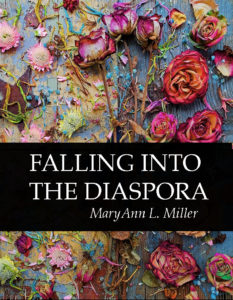 Review by Anne Kaier
Review by Anne Kaier
In this splendid series of poems, MaryAnn L. Miller charts the lives of two of her foremothers: her own mother, Mafalda Curzi from Western Pennsylvania and Princess Mafalda of the Italian royal family who died at Buchenwald concentration camp during World War II. On first sight, the two Mafaldas have nothing in common but their name—Italian for strength in battle. Mafalda Curzi was a brilliant woman who interrupted her college education to take a job that would help support her family during the Depression. Mafalda of the House of Savoy was married in “a headdress/fashioned from gold sheaves of wheat.”
Miller follows these two women from their disparate childhoods, marriages, and motherhoods right through their deaths. By the end of the book, you see that Miller, in various ingenious ways, has equated the history of her family with the history of the Italian Princess. One of Miller’s most effective strategies is to quote from historical documents drawn from the lives of both Mafaldas. For example, she uses an official report about the royal Mafalda’s death in the camp where she was sent as a political prisoner especially loathed by Hitler who thought that she was working against the Nazis:
No doctor visited the Princess [sic]during the night of her death
and therefore the secondary hemoragy was not
perceived.
Miller juxtaposes this seemingly dry report with an excerpt from her mother Mafalda’s Autograph Book on graduation from Butler Senior High School 1927.
Dear Mafalda,
When your days on earth are ended
And this earth no more you trod
May your name in ‘Gold’ be written
In the autograph of God.
Your friend,
Helen Czep
We can’t miss how the mention of gold subtly echoes the golden headdress the royal Mafalda wore on her wedding day. This kind of delicate touch shows the artistry of Miller’s technique. It’s pleasing in itself. It also helps to equate the Princess’s experience with the life of the schoolgirl in Western Pennsylvania. It’s a profoundly American trope. Miller democratizes the two Mafaldas, the one royal, the other befriended by an immigrant’s daughter, Helen Czep. I loved the mention of her name. It summoned up a young girl from a family originally from what’s now the Czech Republic, lands in the same part of the world where Princess Mafalda lived and died. Who was Helen? We don’t know, but her name there is as specific as Princess Mafalda’s.
Life and death and the strength of Italian women in facing both are recurring themes in all the moving poems of Falling Into The Diaspora, Miller’s third poetry book. She is also an accomplished visual artist and printmaker. Her artist books are in the collections of Stanford University, the Bieneke Library at Yale and the National Museum of Women in the Arts. The book about the Mafaldas illustrates her artist’s eye in ways that delight the reader and also reinforce her method of calling attention to documentation—the underlying historical beams which gird her superstructure bringing the histories of both Mafaldas together. Several of her most affecting poems are “concrete.” Laid out on the page, the form echoes the content. For example, “The Midwife’s Tambourine,” which looks round like its namesake, describes the power of an old musical instrument which Miller’s grandmother Maria Grazia brought to America. In Italy, the musician used it to help women in childbirth. In America, Miller herself shook the tambourine as a toy when she was a child until, as a grown woman, she learned:
why the drum’s rim is painted red, long after her own
children were born. Your Grandmother Gregario made
that drum, scraped and stretched the goat hide, her
husband carved and bent the wood, cut the jingles
out of tin cans, painted the circle scarlet to
identify its sacred use—it has a history
in blood and water that
will not change.
This lovely poem echoes the elemental facts of most women’s lives—family and childbirth, beliefs and strengths handed down through generations of women. These are themes central to readers of MER. However, Miller’s highly unusual technique of broadening out the history of one family’s strongwomen to draw them into a mesh with another family’s strong women makes this book unique in my experience. The documents we read here and the concrete poems bring an aura of historical accuracy, make the reality of these lives tangible—even while highlighting the artifice of her technique. It’s a very sophisticated book. It’s also a book you will savor again and again—and won’t easily forget.
Falling Into the Diaspora by MaryAnn L. Miller
Finishing Line Press, 2023, $20.99 [paper]
979-8-88838-213-4
Anne Kaier won the Propel Poetry Award for How Can I Say it was Not Enough? (forthcoming from Nine Mile Books). Her poetry appears in Beauty is a Verb: An Anthology of Poetry, Poetics, and Disability. Her essay “Maple Lane” was mentioned as a Notable in Best American Essays. Her work appears in About Us: Essays from the Disability Series of the New York Times and other venues.
